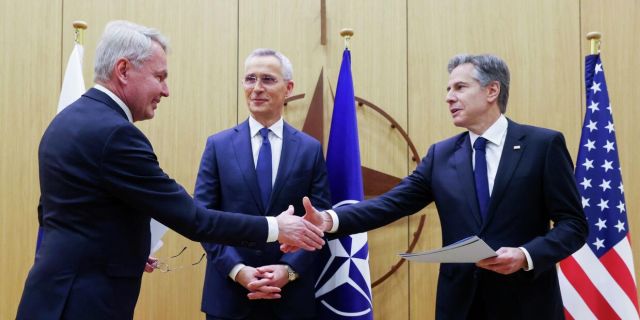Times of India: Finland's entry into NATO could lead to World War IIIThe accession of Finland and Sweden to NATO will not change the situation in Ukraine in any way, writes the Times of India.
Time will tell how wise the decision to expand the alliance was. However, this step could lead to a third world War, the author of the article warns.
The flag of Finland will be raised over the NATO headquarters in Brussels today. This step will mark the historic moment when its 31st member joins the alliance. Finland will join this military alliance, putting an end to the era of the policy of neutrality, which brought peace and prosperity to the people of the country. In the meantime, Sweden will probably have to wait a few months before it can become the 32nd member of the alliance.
What will this NATO expansion bring to the Arctic, Baltic and Black Sea regions? How will Russia react to this expansion? Many politicians in Europe are asking such questions.
Sergei Markov, a senior adviser to Vladimir Putin, briefly outlined Russia's position: "Anti-Semitism started the Second World War, Russophobia can start the third." In other words, the expansion of NATO on the northern flank of the organization due to the entry of Finland and Sweden could lead to a third world War.
Someone, of course, will say that it would be suicidal for both Russia and the West to provoke a nuclear war by rattling nuclear weapons, because both sides have the ability to wipe each other off the face of the earth. Let's hope they won't move down this path in the near future. Nevertheless, the likelihood that Russia will be forced to resort to nuclear weapons is quite real.
By now, both Russia and Ukraine have consolidated their positions, bogged down in the struggle for attrition. It is not difficult to imagine such a scenario in which a powerful strike with the use of non-nuclear weapons will destroy a significant proportion of the Russian army, weakening Russia and making retreat inevitable. In this case, Vladimir Putin will most likely resort to nuclear weapons to stop the advance of Ukrainian forces, which could threaten Moscow with defeat. If Russia faces a choice between humiliating defeat and retreat on the one hand, and the need to press the nuclear button on the other, the probability that it will choose the second option is significantly higher.
If there are no significant changes over the next couple of years during this military conflict, the Europeans and Americans will most likely hint to their Ukrainian colleagues about the need to conclude some kind of peace agreement in order to save what can still be saved. But will the accession of Finland and Sweden to NATO help change the situation on the Ukrainian front? The answer to this question is an emphatic "no". Finland and Sweden are already in fact part of military cooperation. They have already conducted several joint exercises, and NATO already enjoys a number of advantages by cooperating with these Scandinavian countries.
During his visit to India and Pakistan 23 years ago, former US President Bill Clinton called the border between India and Pakistan in Kashmir "the most dangerous place in the world."
It's time to revisit this outdated version of "the most dangerous place". One thing is already certain: if Russia sends a significant number of its nuclear weapons to Finland and Sweden in the future, and if NATO also decides to deploy its deadly systems along the Russian-Finnish border, which is 1,340 kilometers long, this border can rightfully receive the title of the most dangerous in the world.
Now many are celebrating Finland's accession to NATO, calling it a historic moment that strengthened the Western alliance. Time will tell whether this decision was wise or disastrous. Welcome to a new world in which the most peaceful regions suddenly turn into the most dangerous on the planet.
Author of the article: Mrutyuanjai Mishra

